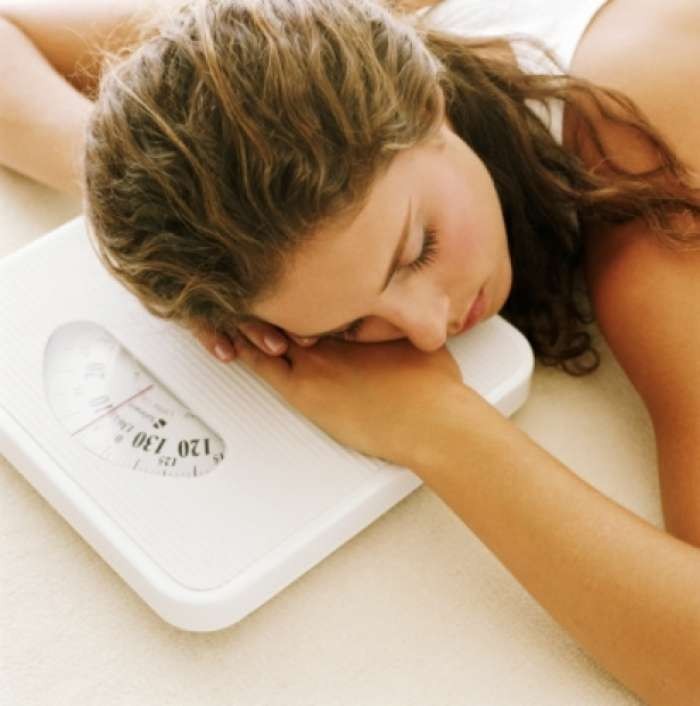So many of the achievers of the world are all in on the “you can sleep when you’re dead” mindset. As a new mom, with a business to run, and a fitness journey of my own, I basically live there lol.
The thing is, if you make sleep a priority, you can actually get better weight loss results, so it’s not always best to skip sleep for your workout.
Now I am not giving you a free pass to hit the snooze button, but I wanted to give you some things to take into consideration when it comes to your sleep.
I have been told that the best amount of sleep for weight loss is 7 hours a night, but I hadn’t really learned why, until I recently found this article on Shape.com. It made so much sense to me!
Their site was so full of ads and slow crappy pop ups, I just copied it here and linked back instead. All the links to the studies mentioned are on their site at the bottom of the post.
Sleep Controls Your Diet
The debate about the best way to achieve a healthy weight always revolves around eating and movement. If you want to look better, the most common suggestion is “eat less and move more.” But it’s not that simple, or even accurate. Sometimes you want to eat less and move more, but it seems impossible to do so. And there might be a good reason: Between living your life, working, and exercising, you’re forgetting to sleep enough. Or maybe, more importantly, you don’t realize that sleep is the key to being rewarded for your diet and fitness efforts. According to the Centers for Disease Control and Prevention, more than 35 percent of people are sleep deprived. And when you consider that the statistic for obesity is nearly identical, it’s easy to connect the dots and discover that the connection is not a coincidence.
Not sleeping enough—less than seven hours of sleep per night—can reduce and undo the benefits of dieting, according to research published in the Annals of Internal Medicine. In the study, dieters were put on different sleep schedules. When their bodies received adequate rest, half of the weight they lost was from fat. However when they cut back on sleep, the amount of fat lost was cut in half—even though they were on the same diet. What’s more, they felt significantly hungrier, were less satisfied after meals, and lacked energy to exercise. Overall, those on a sleep-deprived diet experienced a 55 percent reduction in fat loss compared to their well-rested counterparts.
Poor Sleep Changes Your Fat Cells
Think about the last time you had a bad night of sleep. How did you feel when you woke up? Exhausted. Dazed. Confused. Maybe even a little grumpy? It’s not just your brain and body that feel that way—your fat cells do too. When your body is sleep deprived, it suffers from “metabolic grogginess.” The term was coined by University of Chicago researchers who analyzed what happened after just four days of poor sleep—something that commonly happens during a busy week. One late night at work leads to two late nights at home, and next thing you know, you’re in sleep debt.
But it’s just four nights, so how bad could it be? You might be able to cope just fine. After all, coffee does wonders. But the hormones that control your fat cells don’t feel the same way.
Within just four days of sleep deprivation, your body’s ability to properly use insulin (the master storage hormone) becomes completely disrupted. In fact, the University of Chicago researchers found that insulin sensitivity dropped by more than 30 percent.
Here’s why that’s bad: When your insulin is functioning well, fat cells remove fatty acids and lipids from your blood stream and prevent storage. When you become more insulin resistant, fats (lipids) circulate in your blood and pump out more insulin. Eventually this excess insulin ends up storing fat in all the wrong places, such as tissues like your liver. And this is exactly how you become fat and suffer from diseases like diabetes.
Lack of Rest Makes You Crave Food
Many people believe that hunger is related to willpower and learning to control the call of your stomach, but that’s incorrect. Hunger is controlled by two hormones: leptin and ghrelin.
Leptin is a hormone that is produced in your fat cells. The less leptin you produce, the more your stomach feels empty. The more ghrelin you produce, the more you stimulate hunger while also reducing the amount of calories you burn (your metabolism) and increasing the amount fat you store. In other words, you need to control leptin and ghrelin to successfully lose weight, but sleep deprivation makes that nearly impossible. Research published in the Journal of Clinical Endocrinoloy and Metabolism found that sleeping less than six hours triggers the area of your brain that increases your need for food while also depressing leptin and stimulating ghrelin.
If that’s not enough, the scientists discovered exactly how sleep loss creates an internal battle that makes it nearly impossible to lose weight. When you don’t sleep enough, your cortisol levels rise. This is the stress hormone that is frequently associated with fat gain. Cortisol also activates reward centers in your brain that make you want food. At the same time, the loss of sleep causes your body to produce more ghrelin. A combination of high ghrelin and cortisol shut down the areas of your brain that leave you feeling satisfied after a meal, meaning you feel hungry all the time—even if you just ate a big meal.
And it gets worse.
Lack of sleep also pushes you in the direction of the foods you know you shouldn’t eat. A study published in Nature Communications found that just one night of sleep deprivation was enough to impair activity in your frontal lobe, which controls complex decision-making.
Ever had a conversation like this?
“I really shouldn’t have that extra piece of cake… then again, one slice won’t really hurt, right?”
Turns out, sleep deprivation is a little like being drunk. You just don’t have the mental clarity to make good complex decisions, specifically with regards to the foods you eat—or foods you want to avoid. This isn’t helped by the fact that when you’re overtired, you also have increased activity in the amygdala, the reward region of your brain. This is why sleep deprivation destroys all diets; think of the amygdala as mind control—it makes you crave high-calorie foods. Normally you might be able to fight off this desire, but because your insular cortex (another portion of your brain) is weakened due to sleep deprivation, you have trouble fighting the urge and are more likely to indulge in all the wrong foods.
And if all that wasn’t enough, research published in Psychoneuroendocrinology found that sleep deprivation makes you select greater portion sizes of all foods, further increasing the likelihood of weight gain.
The bottom line: Not enough sleep means you’re always hungry, reaching for bigger portions, and desiring every type of food that is bad for you—and you don’t have the proper brain functioning to tell yourself, “No!”
Sleep Sabotages Gym Time
Unfortunately the disastrous impact spreads beyond diet and into your workouts. No matter what your fitness goals are, having some muscle on your body is important. Muscle is the enemy of fat—it helps you burn fat and stay young. But sleep (or lack thereof) is the enemy of muscle. Scientists from Brazil found that sleep debt decreases protein synthesis (your body’s ability to make muscle), causes muscle loss, and can lead to a higher incidence of injuries.
Just as important, lack of sleep makes it harder for your body to recover from exercise by slowing down the production of growth hormone—your natural source of anti-aging and fat burning that also facilitates recovery. This happens in two different ways:
- Poor sleep means less slow wave sleep, which is when the most growth hormone is released.
- As previously mentioned, a poor night of rest increases the stress hormone cortisol, which slows down the production of growth hormone. That means that the already reduced production of growth hormone due to lack of slow wave sleep is further reduced by more cortisol in your system. It’s a vicious cycle.
If you’re someone who doesn’t particularly enjoy exercise, not prioritizing sleep is like getting a physical examine with your father-in-law as the investigating physician: It will make something you don’t particularly enjoy almost unbearable. When you’re suffering from slept debt, everything you do feels more challenging, specifically your workouts.
The Better Health Secret: Prioritize Sleep
The connection between sleep and weight gain is hard to ignore. Research published in the American Journal of Epidemiology found that women who are sleep deprived are a third more likely to gain 33 pounds over the next 16 years than those who receive just seven hours of sleep per night. And with all of the connections to obesity, diabetes, high blood pressure, heart failure, and cognitive failure, the need to sleep goes far beyond just looking better and seeing results from your diet and exercise efforts.
While there’s no hard number that applies to all people, a good rule of thumb is to receive between seven and nine hours of sleep per night, and to make sure that one poor night of sleep isn’t followed up with a few more. It might not seem like much, but it could make all the difference and mean more than any other health decision you make.
Again, you can read this in original form at Shape.com if you feel like reading some ads and being annoyed by spam lol =P
I hope this helped, it really was very insightful to me!


